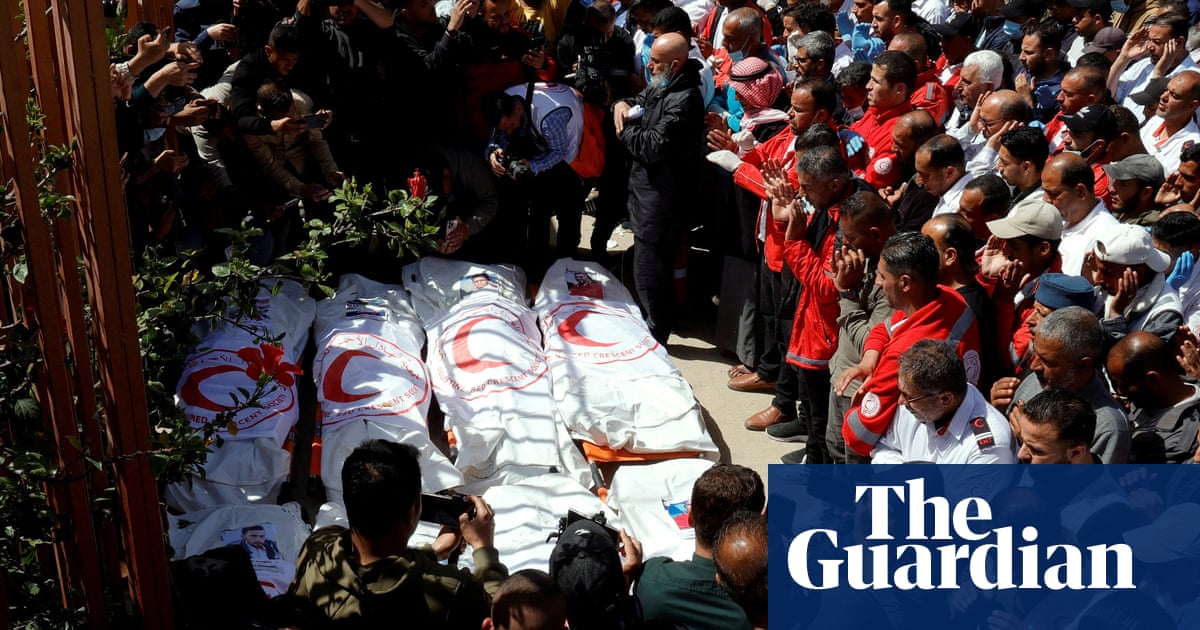Israel’s military has admitted to several “professional failures” and a breach of orders in the killing of 15 rescue workers in Gaza last month, and said that it was dismissing a deputy commander responsible.
The deadly shooting of eight Red Crescent paramedics, six civil defence workers and a UN staffer by Israeli troops, as they carried out a rescue mission in southernGazaat dawn on 23 March, had prompted international outcry and calls for a war crimes investigation.
Their bodies were uncovered days after the shooting, buried in a sandy mass grave alongside their crushed vehicles. The UN said theyhad been killed “one by one”. Israel at first claimed that the medics’ vehicles did not have emergency signals on when troops opened fire but later backtracked after phone video recovered from one of the medics contradicted the account.
On Sunday, the military said an investigation had “identified several professional failures, breaches of orders, and a failure to fully report the incident”.
As a result, the deputy commander ofthe IDF’s Golani Brigade“will be dismissed from his position due to his responsibilities as the field commander … and for providing an incomplete and inaccurate report during the debrief”.
Another commander, whose unit was in operation in the southern city of Rafah where the killings took place, would be censured for “his overall responsibility for the incident”, the military said.
Despite admitting mistakes, the report does not recommend any criminal action to be taken against the military units responsible for the incident and found no violation of the IDF’s code of ethics.
The report maintains, without providing further evidence, that six of the 15 Palestinians killed were Hamas militants. Previous claims by Israel along the same lines have been denied by Red Crescent.
The investigation provided the most thorough account from Israel’s forces about what they alleged took place that night. According to the report, it was an “operational misunderstanding” by Israeli forces that led them to fire on the ambulances. They denied that there had been any “indiscriminate fire” and claimed troops were simply alert to “real threats” from Hamas on the ground, accusing the militant group of regularly using ambulances to transport weapons and terrorists.
The investigation claimed that “poor night visibility” was to blame for the deputy battalion commander’s conclusion that the ambulances belonged to Hamas militants and began firing on them.Video footage that emergedfrom the scene showed that the ambulances were clearly moving with flashing emergency lights.
The investigation also found that the shooting of a UN vehicle, which drove past 15 minutes later, was carried out in violation of orders.
After uncovering the bodies from a sandy grave in Gaza days later, a UN official said the workers had been killed “one by one”, while the head of the Palestinian Red Crescent Society has said the men were “targeted at close range”.
Some witnesses and relatives have also alleged that there was evidence that at least one of the victims hadhad their hands bound.
The military’s report said there was “no evidence to supportclaims of executionor that any of the deceased were bound before or after the shooting”. Ahmed Dhair, the forensic pathologist in Gaza who carried out the postmortems on the victims, said last week that he had he had not seen visible signs of restraint.
The Israeli military also defended the decision by soldiers to “evacuate” the bodies the next morning and claimed that while the decision to crush their vehicles was wrong, “there was no attempt to hide the incident”.
Dhair told the Guardian last week that the postmortems showed that the victims were mostly killedby gunshots to the head and torso, as well as injuries caused by explosives. Dhair alleged evidence of “explosive bullets”in the bodies he had examined.
A Red Crescent spokesperson said the group would publish a statement in response to the findings by Monday. Last week it said that one of the two Palestinian paramedics who had survived the shooting, Assad al-Nsasrah,remained in Israeli detention.
The Israeli statement on the findings concluded by saying that Israel’s military “regrets the harm caused to uninvolved civilians”.
Palestinians and international human rights groups have repeatedly accused Israel’s military of failing to properly investigate or whitewashing misconduct by its troops.
The international criminal court, established by the international community as a court of last resort, has accused the Israeli prime minister, Benjamin Netanyahu, and the former defence minister Yoav Gallantof war crimes. Israel, which is not a member of the court, has long asserted that its legal system is capable of investigating the army, and Netanyahu has accused the ICC of antisemitism.
